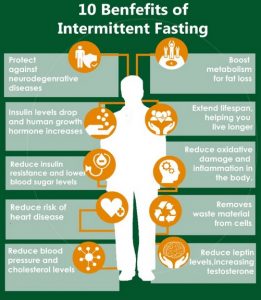Intermittent Fasting – A Simpler Way to Eat
Most of us grew-up hearing ” breakfast is the most important meal of the day” but what if that isn’t the case?
Intermittent fasting has gained a great deal of attention in the past years for the benefits in weight loss, overall healthier-eating, and a way to simplify our lifestyles. Popularized by Martin Berkhan, a nutritional consultant from Leangains, the success of intermittent fasting lies in the fact that it is not a diet but a lifestyle change. Intermittent fasting is divided into two stages, fasting and feeding. The most common type of fasting is the 16:8 known as the Leangains method, consisting of a 16 hour fast followed by an eight hour feeding period with no dietary restrictions.

16:8 Intermittent Fasting Pattern Credit: StayWow
Fasting and Our Ancestors
Our ancestors did not have the luxuries we have today, they had to hunt their food and this could lead to not finding anything to eat for hours or days at a time. This is the basis of intermittent fasting, going back to our old roots. By allowing our bodies to function as they are intended to do. Studies have shown, intermittent fasting protects against diabetes, obesity, cancers, heart disease, hypertension, neurodegeneration, and many more benefits.

Benefits of Intermittent Fasting Credit: Fitness Junction
OUR BRAIN AND FASTING
One of the biggest misconceptions is that our brain can only use glucose for energy, but this could not be further away from the truth. In reality, while in the fasting state, our brains can utilize ketone bodies as a source of energy.
While fasting, brain proteins increase as the stress of fasting causes the body to preserve this very important organ. One of the most important brain proteins is a brain-derived neurotrophic factor, BDNF. This protein works by growing neurons and as a natural antidepressant. In addition, it has been shown to help neurons stay healthier and resist brain diseases like dementia.
A study conducted by Dr. Bredesen consisted of ten patients with early signs of Alzheimer’s disease. The patients started to fast for 12 hours a day and were tested for cognitive improvement or decline. Within 3-6 months, nine out of the ten patients had shown a reversal in cognitive decline. Studies on the cognitive benefits of fasting are booming and more research is being invested to show the benefits of fasting on the brain.
Video of What Intermittent Fasting Does to Your Brain Credit: Gravity Transformation – Fat Loss Experts
OVERALL BENEFITS OF FASTING
As we’ve seen, fasting is great for brain health, but the benefits do not end there. Fasting has been proven to increase levels of human-growth hormone, HGH, which is essential for cellular regeneration and decrease in body fat. It has also been shown to reduce insulin resistance and in this way decreases the chances of type-2 diabetes.
With all of the benefits of fasting, it is no wonder why this new lifestyle is gaining popularity so fast.
https://soundcloud.com/atpproject/episode-116-intermittent-fasting
Podcast on Intermittent Fasting Credit: The ATP Project on SOUNDCLOUD
Maria-Fernanda Arcila

2 responses to “Intermittent Fasting”